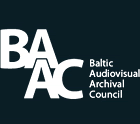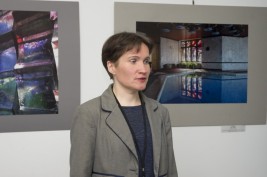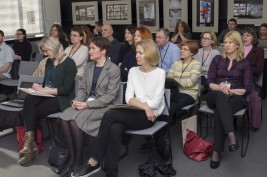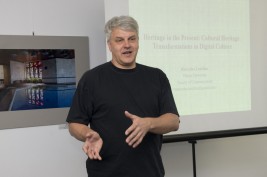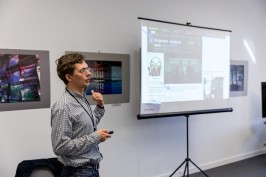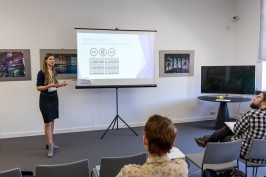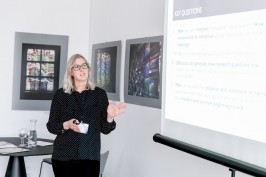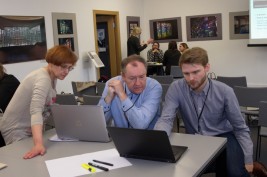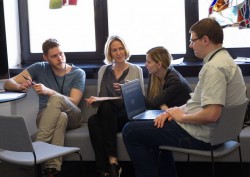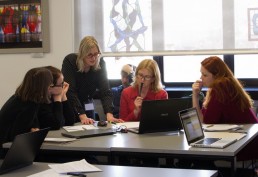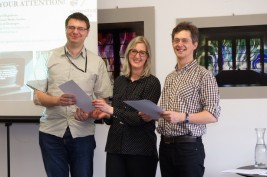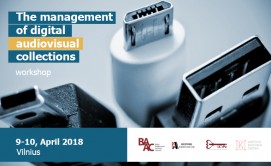International Workshop: “The Management of Digital Audiovisual Heritage Collections” Vilnius, Lithuania
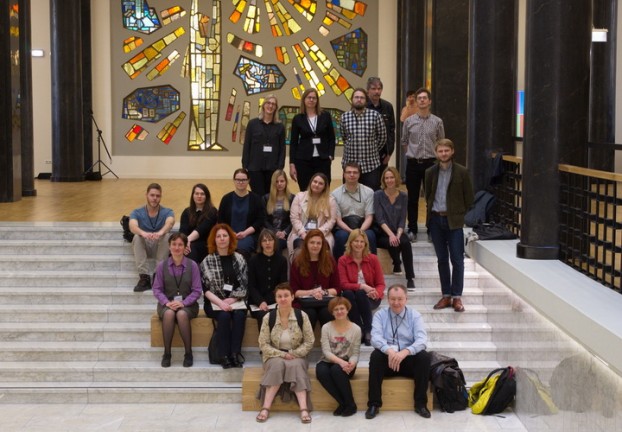
April 2018, Vilnius
During last few years we are noticing that more and more audiovisual content is digital and is published online. There are many websites created by audiovisual memory institutions where people can watch films, listen to sound recordings or navigate through historical photo material. However, an increasing amount of available digital content inevitably creates various problems and challenges concerning management of this content. There is almost no tradition or experience, neither in Lithuania nor the other Baltic States, as to what digital content to preserve and how to store it; how to create metadata and manage databases; how to harmonize technologies and users needs. On the other hand, it is very important to digitize audiovisual content not only for preservation, but also for wider reuse. How and why do users interact with digital audiovisual resources? What could each audiovisual memory institution do to attract audiences and engage users?
Seeking to provide opportunities for memory institutions’ specialists to get acquainted with actual questions of handling, preserving, and giving access to digital audiovisual collections, the Lithuanian Central State Archive together with the Baltic Audiovisual Archival Council (BAAC) and Archivists’ Association organized the international workshop, “The Management of Digital Audiovisual Heritage Collections”. The workshop took place on April 9-10, 2018 and was hosted by the Lithuanian National M.Mažvydas Library. Specialists from Lithuanian, Latvian, Estonian and the Czech Republic archives, libraries and museums participated in the workshop. The lecturers of the workshop were Prof. Rimvydas Laužikas (Vilnius University Communications Faculty); Dr. Berber Hagedoorn (University of Groningen, the Netherlands); Juozas Markauskas (BAAC, ICCROM lecturer); Jurga Gradauskaitė (iLaw association).
The first day of the workshop started with an introductory lecture about cultural heritage transformations in digital society by Vilnius University professor Rimvydas Laužikas. He talked about digital culture challenges and dilemmas, importance of open access and sharing, and the role of digital heritage preservers and curators in present day society. Vice-president of the Baltic Audiovisual Archival Council Juozas Markauskas introduced principles of metadata creation and management of databases, and standards and best practises of preservation of different kinds of digital audiovisual content. He gave detailed answers to the questions which are often faced by memory institutions’ specialists in their everyday work: what are metadata, why metadata are so important, how to deal with various cataloguing challenges. J. Markauskas talked about various types and standards of metadata, and gave practical recommendations of metadata creation and application of standards. While talking about long-term digital preservation, he paid attention to the fact that there are still no common file standards for sound and video preservation. He also talked about challenges of digital preservation, which are often faced by memory institutions’ specialists. J.Markauskas gave various practical recommendations on how and in what formats digital content should be stored, how to find a balance between long-term preservation and ensuring access and reuse. Lawyer Jurga Gradauskaitė talked about various aspects of IPR in digital space. She introduced “The Methodology for Labelling Digital Culture Heritage Objects”, which was created last year together with the Lithuanian National M.Mažvydas Library. The methodology will be led by a virtual tool for memory institutions’ specialists, and will be introduced this year.
The second day of the workshop was dedicated to questions about digital content curation, user engagement and reuse. In her introductory lecture, Dr. Berber Hagedoorn from Groningen University (the Netherlands) talked about virtual platforms of digital audiovisual content and methods, which could be used for the analysis of audiovisual resources. During the practical part of the workshop, participants were asked to become researchers themselves: analyse digital audiovisual resources, choose research topics, create a narrative and show it in a poster. There were small task groups where participants worked together to create posters and discuss the role of digital audiovisual resources. These practical tasks were a challenge for the workshop’s participants, but this practice is quite popular in other countries. While taking the role of content users, the specialists from memory institutions could get ideas on how to make digital audiovisual content more interesting and attractive to users.
At the end of the workshop, participants were asked to evaluate the programme, themes, and its relevance. Summarizing the responses, it is a pleasure to mention that the workshop was quite useful, with actual and important themes. Participants also expressed a desire to attend future workshops concerning the management of audiovisual heritage.
The international workshop, “The Management of Digital Audiovisual Heritage Collections”, was organized implementing the project of the same name. It was partially financed by the Lithuanian Culture Council. The main goals of the project were, to introduce specialists from memory institutions to actual and practical decisions and practices concerning handling, preservation, access, user engagement and reuse of digital audiovisual heritage collections; to contribute to the safeguarding, accessing, popularization and dissemination of Lithuanian digital audiovisual heritage; to strengthen relations among the international community of audiovisual heritage specialists, while making it possible to share experiences. According to the workshop’s organizers, all tasks of the project were successfully fulfilled.
Organizers:
 |
 |
 |
Workshop sponsored by Lithuanian Culture Council
 |
Photos by Inga Liubomirskaitė, Larisa Dmuchovskaja, Vygaudas Juozaitis
